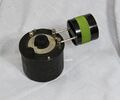358: Difference between revisions
Jump to navigation
Jump to search
No edit summary |
No edit summary |
||
| Line 15: | Line 15: | ||
The {{Title|General Radio 358 Amateur Band Wavemeter}} was introduced in {{Bulletin 926}} and remained available through {{Catalog K1}}. | The {{Title|General Radio 358 Amateur Band Wavemeter}} was introduced in {{Bulletin 926}} and remained available through {{Catalog K1}}. | ||
The Type 358 is an absorption type wavemeter covering the four overlapping bands. It has | The Type 358 is an absorption-type wavemeter covering the four overlapping bands. It has a frequency accuracy of 1% and uses an incandescent lamp as a resonance indicator. The lamp is in a special socket that closes the connection when the lamp is removed if not needed. | ||
Each wavemeter is supplied with a calibration chart produced with settings accurate for that particular meter. | |||
A [[247|Type 247]] gear-driven condenser is used inside the meter. | |||
==Specifications== | ==Specifications== | ||
Revision as of 01:17, 6 April 2024
The General Radio 358 Amateur Band Wavemeter was introduced in Bulletin 926 (1924) and remained available through Catalog K1 (1939).
The Type 358 is an absorption-type wavemeter covering the four overlapping bands. It has a frequency accuracy of 1% and uses an incandescent lamp as a resonance indicator. The lamp is in a special socket that closes the connection when the lamp is removed if not needed.
Each wavemeter is supplied with a calibration chart produced with settings accurate for that particular meter.
A Type 247 gear-driven condenser is used inside the meter.
Specifications
- Frequency Ranges
- Wavelength: 14 to 28 Meters, 26 to 56 Meters, 54 to 114 Meters, 105 to 220 Meters
- Frequency: 10.0 to 20.0 MHz, 5.0 to 10.0 Mhz, 2.5 to 5.0 MHz, 1.5 to 3.0 MHz
- Accuracy: 1%
Links
- Experimenter describing Type 358 February 1926
- Experimenter describing the calibration of Type 358 July 1927










